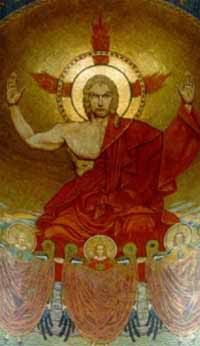What I liked about DEUS CARITAS EST Encyclical

The punch line....
Certainly Job could complain before God about the presence of incomprehensible and apparently unjustified suffering in the world. In his pain he cried out: “Oh, that I knew where I might find him, that I might come even to his seat! ... I would learn what he would answer me, and understand what he would say to me. Would he contend with me in the greatness of his power? ... Therefore I am terrified at his presence; when I consider, I am in dread of him. God has made my heart faint; the Almighty has terrified me” (23:3, 5-6, 15-16). Often we cannot understand why God refrains from intervening. Yet he does not prevent us from crying out, like Jesus on the Cross: “My God, my God, why have you forsaken me?” (Mt 27:46). We should continue asking this question in prayerful dialogue before his face: “Lord, holy and true, how long will it be?” (Rev 6:10). It is Saint Augustine who gives us faith's answer to our sufferings: “Si comprehendis, non est Deus”—”if you understand him, he is not God.” [35] Our protest is not meant to challenge God, or to suggest that error, weakness or indifference can be found in him. For the believer, it is impossible to imagine that God is powerless or that “perhaps he is asleep” (cf. 1 Kg 18:27). Instead, our crying out is, as it was for Jesus on the Cross, the deepest and most radical way of affirming our faith in his sovereign power. Even in their bewilderment and failure to understand the world around them, Christians continue to believe in the “goodness and loving kindness of God” (Tit 3:4). Immersed like everyone else in the dramatic complexity of historical events, they remain unshakably certain that God is our Father and loves us, even when his silence remains incomprehensible.
Faith, hope and charity go together. Hope is practised through the virtue of patience, which continues to do good even in the face of apparent failure, and through the virtue of humility, which accepts God's mystery and trusts him even at times of darkness. Faith tells us that God has given his Son for our sakes and gives us the victorious certainty that it is really true: God is love! It thus transforms our impatience and our doubts into the sure hope that God holds the world in his hands and that, as the dramatic imagery of the end of the Book of Revelation points out, in spite of all darkness he ultimately triumphs in glory. Faith, which sees the love of God revealed in the pierced heart of Jesus on the Cross, gives rise to love. Love is the light—and in the end, the only light—that can always illuminate a world grown dim and give us the courage needed to keep living and working. Love is possible, and we are able to practise it because we are created in the image of God. To experience love and in this way to cause the light of God to enter into the world—this is the invitation I would like to extend with the present Encyclical.




0 Comments:
Post a Comment
<< Home